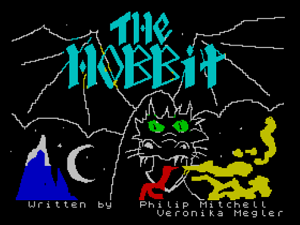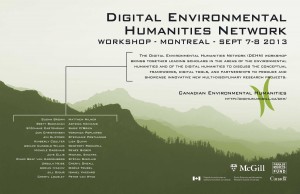I’m here at the 1st Inaugural Texas Digital Humanities Conference/a> at the University of Houston and keeping my conference notes here. One of the threads of the conference is network analysis and the other is collaboration. I stuck to the network stream and have been swimming in interesting visual ideas and concepts.
Category: Humanities Computing
Nel Mondo delle Digital Humanities – TechnoNews
Giorgio Guzzetta has edited an interview taped with me in Italian at Nel Mondo delle Digital Humanities – TechnoNews. He posted both the edited video (see above) and the full interview with the noise of Rome in the background. With Domenico Fiormonte he also wrote an essay “Nel Mondo delle Digital Humanities” (In the World of Digital Humanities).
Digital Preservation in a Box
From Twitter a link to Digital Preservation in a Box. This site by the National Digital Stewardship Alliance gathers useful links to articles covering the basics of digital preservation. Some of the sections include:
- Digital Preservation 101
- Glossary
- Preservation by Format
- Tools
- Storage, Cloud Computing and Personal Options
- Resources for Educators
Grad Student Mini-Conference On The Digital Humanities
Stéfan Sinclair invited me to a half-day conference and lunchy that closed his LLCU-602: Digital Humanities – New Approaches to Scholarship course. You can see my conference notes at Grad Student Mini-Conference On The Digital Humanities. At lunch while the others were eating I was asked to talk about careers in the digital humanities. My talk was on “Thinking Through” as a practice in the humanities that is open to the digital. I started by talking about the recent Von Trotta film about Hannah Arendt which presents Arendt as an uncompromising advocate for thinking for oneself. I tried to spin out how one might think for oneself through the epochal interactive matter we have before us.
What I didn’t have time to argue was how thinking through is for me an alternative way of characterizing what we do in the digital humanities. It is an alternative, on the one hand, to Willard McCarty’s argument for modeling (as the model, so to speak), and Matt Kirchenbaum’s argument that for the digital humanities “as/is” tactical.
My argument suffers from some of the same problems that Fish finds in Ramsay’s work (in whose company I quite happy to be); namely that I find the digital humanities both to be an extension of existing humanistic ways of thinking and also a new way. I tried to show how it is simultaneously an old way of thinking and a new one. What has changed is the matter(s) we think through and the dangers we ford. The new matters are the digital evidence and computing affordances. The new dangers are the discourses of efficiency and instrumentality.
Defining Digital Humanities
Melissa Terras, Julianne Nyhan and Edward Vanhoutte have just edited a reader on Defining Digital Humanities. I have two works in this collection, “Is Humanities Computing an Academic Discipline”, which is a paper I gave for a seminar at the University of Virginia, and a blog entry “Inclusion in the Digital Humanities”. I also note that they have selected definitions (of DH) from the Day of Digital Humanities. This seems to be a trend now – books introducing the field include definitions culled from the project.
Historical Software Collection: Internet Archive
The Internet Archive has started a Historical Software Collection. This is part of a larger Internet Archive Software Collection that has a number of collections. What is cool is that they have an in-browser emulator that allows you to play with historical software like Visicalc or Atari’s E.T. in the browser. This is a Javascript version of MESS called JSMESS. They are not just archiving the code, but ensuring that there are ways to try the software too.
I learned about this from David Rosenthal’s blog entry on In-Browser Emulation which is worth reading.
Research Records Stewardship Guidance Procedure
The University of Alberta has just passed a Research Records Stewardship Guidance Procedure which says that we “are responsible for the stewardship of the research records created, acquired, managed or preserved.” The procedure specifically says,
The Principal Investigator (PI) is responsible for the collection, maintenance, confidentiality, and secure retention of research records until such time as the University may assume responsibility for their management and preservation.
The good news is that we have excellent support in the Library for dealing with research records. We have the Education and Research Archive where we can deposit data. We also have staff in the Digital Initiatives unit of the Library who can help us develop research management plans.
I joined forces with Geoff Harder and Chuck Humphrey to give a presentation on Data Management Plans (my slides).
The end of the Digital Humanities Observatory
As of August 30, 2013 the activities of Digital Humanities Observatory have ceased.
I just got an email today announcing the end of the Digital Humanities Observatory of Ireland. The DHO Home Page has the same text. As I was on the external board for a few years I’m sorry to see this neat Observatory end. (No more two day trips to Ireland in December.) Like many units set up with grant funding it was probably inevitable, but it is still a shame, especially since they were running useful infrastructure for the discovery of Irish projects, DHO:discovery and DHO:DRAPIer.
Others have noted the importance of learning from endings in a field where we make a lot of noise when starting things. Honest appraisals of why things ended are few and far between. This summer I heard Quinn Dombrowski talk about “What ever happened to Project Bamboo?” at DH 2013. (You can see my conference notes on DH 2013 and her talk here.) What can be learned from the spectacular rise and now closing of the DHO? Here are some lessons:
- Anything funded by a time-limited grant as the DHO was is bound to run out of money. Units on soft money can survive over time, but they have to find new revenue streams.
- Grant funded units that build things (like DHO:Discover and DRAPIer) that are meant to be useful over the long term should build succession planning into their development. Don’t count on getting more money just because you built something neat. There is a neat paper waiting to be written about how one can build for succession or hand-off.
- Give yourself time at the end to properly archive what you have done. Make sure that the useful knowledge gathered is saved and accessible.
- Tell people that the project is over, as the DHO has done. Don’t just close the site – put an announcement up.
- Write an obituary, if you can, so that others can learn from the project.
- Grieve don’t hide. We often want to slink away when something closes, but we should be allowed to grieve the passing of centres, projects and so on. I’m sad that the DHO is closed, even though I was only looking in from the outside.
The full text of the message continues:
Over the past five years, the Digital Humanities Observatory (http://dho.ie) has been a crucial component of the Humanities Serving Irish Society initiative funded under PRTLI 4. The DHO has carried out an extensive programme of lectures, workshops, summer schools, symposia and public lectures. These have been eagerly received and we have hopefully contributed to raising the level of digital humanities scholarship amongst Irish scholars, enhancing skills and reputations not just in Ireland, but also in Europe and around the world. We have developed and deployed creative, and innovative digital platforms such as DHO:Discovery (http://discovery.dho.ie) and DHO:DRAPIer (http://dho.ie/drapier) that have embraced the needs of HSIS scholars and established a strong and respected Irish position in the Digital Humanities leading to Irish participation in exciting new European initiatives such as DARIAH. In an effort to explore the possibilities of Digital Humanities online, and in collaboration with our HSIS partners, we have also built many cutting-edge digital editions and catalogues such as Saint Patrick’s Confessio Hyperstack (http://www.confessio.ie/), the Doegen Records Web Archive (http://dho.ie/doegen/) and Reading East (http://www.ucd.ie/readingeast/).
In the immediate term the assets of the DHO will be maintained directly by the RIA. Please use the contact form (http://dho.ie/contact) should you need to be in touch with the those maintaining the DHO assets.
Strong Irish engagement and participation in European projects is one of the many testaments to the success of the DHO and of the HSIS consortium. In the future the newly formed Irish Humanities Alliance (https://www.ria.ie/about/our-work/policy/irish-humanities-alliance.aspx) will be fulfilling a role of humanities advocacy on behalf of Irish higher education institutions. The investment in HSIS and the DHO has put Irish humanities scholars in a solid position to continue to grow this valuable community and allow it to flourish in the future.
Digital Environmental Humanities
This weekend I was at a neat workshop on Digital Environmental Humanities organized by Stephanie Posthumous at McGill University. You can see my workshop notes here, Digital Environmental Humanities Network. I was struck at the importance of research and activism from the humanities on the issue of the environment. Too often issues are framed as scientific or policy (social scientific). The humanities bring a historical, philosophical, ethical, and critical perspective that is needed.
The workshop brought together folks working in environmental humanities and others (like me) in the digital humanities to see if we could articulate a common research agenda. I was struck by similarities in the evolution of these two applied fields – including the tensions around interdisciplinarity. By the end I could see a useful collaboration to develop a suite of outreach venues for environmental humanities including:
- An environment for curators to pull together “issues” that include different media. This would have some of the features of the Journal of Digital Humanities, but not necessarily be a journal.
- One of the types of “issues” gathered could be e-books with media components suitable for teaching about the environment and culture.
- Another type of “issue” could be documentation from an arts intervention.
- Many of these issues and interventions could be designed from the beginning to have a hybrid existence. For example, documentation from an arts performance could be gathered in the curatorial environment and later edited into a catalogue for print publication.
- A related idea would be a NINES-like federated repository for finding, reviewing, and curating digital interventions.
- Crowdsourcing or citizen science type interface to bring other publics into the discussion.
- Online conferences to minimize the impact of our research on the environment. The idea would be to look at the impact of our research itself and try to find alternative ways of connecting while also asking about how we think about the impact of research on the environment.
DCA 2013: Video of Talk
The folks who organized the Digital Classics Association conference in Buffalo have put a video of my talk on YouTube here, DCA 2013: Geoffrey Rockwell. I blogged about this conference here.

